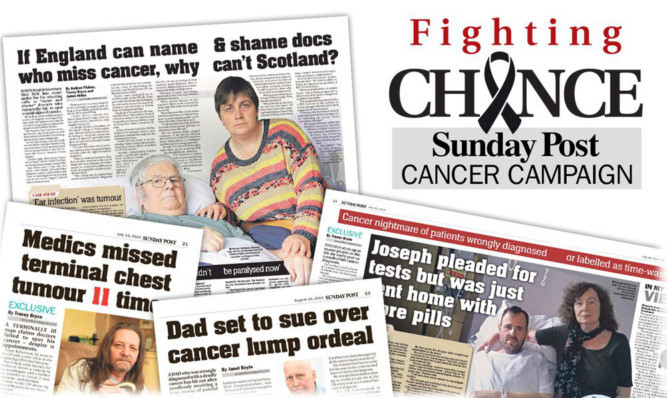
Health Secretary Alex Neil has signalled a major victory for The Sunday Post’s Fighting Chance campaign by launching a raft of cancer beating measures.
He has revealed every cancer patient in Scotland is to be asked to rate their care in a new nationwide survey bringing Scotland in step with England. He has also announced that new guidelines have been given to every GP in the country to remind them of the early signs of cancer and how vital it is they identify symptoms straight away.Join our campaignBoth vital steps signal major victories for our campaign, which only launched in August with the aim of halting the hell of cancer misdiagnosis.
Campaigners last night hailed Fighting Chance and called for the remaining four of its six goals to be met.
“This is a tremendous example of campaigning journalism making a real difference,” said Scottish Conservative health spokesman Jackson Carlaw. “Hopefully cancer patients throughout the country will now feel more influential in terms of not only the treatment and care they receive, but how they can help shape services for the future.”
Scotland was the only country in the UK not to conduct an annual poll of patients. It is hoped the new survey will help to drive up standards of care a step that was last welcomed by charities and opposition parties.
Mr Neil said: “It is only by listening to patients that the NHS can truly appreciate their experiences and learn more about the standard of services they provide.
“As part of our wider commitment to giving patients a stronger voice within our NHS, the Scottish Cancer Taskforce has set out its commitment to carry out a dedicated survey of patients with cancer.
“Dealing with a cancer diagnoses can be both difficult and scary. This survey will provide further insights into the care experienced by patients with cancer across Scotland and allow our NHS to ensure its services focus on what matter most to patients.”
It is hoped the survey will be in place by the end of next year and ministers plan to work with charities and patient groups to come up with the questions to be asked.
Elspeth Atkinson, director of MacMillan Cancer Support in Scotland, said they are “delighted” the Scottish Government “has confirmed that there will be a patient experience survey in Scotland”.
She said: “This is something we had called on the Scottish Government to do as it’s vital the person affected by cancer should be at the centre of their care and this survey will tell us directly what people think of the care they have had, what worked well and what could be done better. It will provide key information to help the improvement of services for everyone with cancer in Scotland.”
The Department of Health in England has published cancer patient experience surveys in four of the last five years.
The annual assessment of more than 100,000 people this year revealed a third of patients feel they are not being given enough support from GPs and nurses while more than a quarter had to visit their doctor three or more times before being referred to hospital.
Mr Carlaw added: “I’m glad the Scottish Government has come round to this view. It’s a sensible approach, and could create a real database of opinion on cancer care for the first time in Scotland from those who really know.”
Meanwhile, new guidelines have been issued to GPs in a bid to stop cancer patients having their symptoms missed. The guidelines have been issued to improve the referral between primary and secondary care for patients and should help to identify those patients who require urgent assessment by a specialist.
Norma Woods, 55, from Denny, Stirlingshire, is battling incurable breast cancer after enduring a six-month delay in getting referred.
Brave Norma helped launch our Fighting Chance crusade against cancer and she is delighted we’ve scored our first victory. “I am really pleased it is a good start, onwards and upwards,” she said.

Enjoy the convenience of having The Sunday Post delivered as a digital ePaper straight to your smartphone, tablet or computer.
Subscribe for only £5.49 a month and enjoy all the benefits of the printed paper as a digital replica.
Subscribe